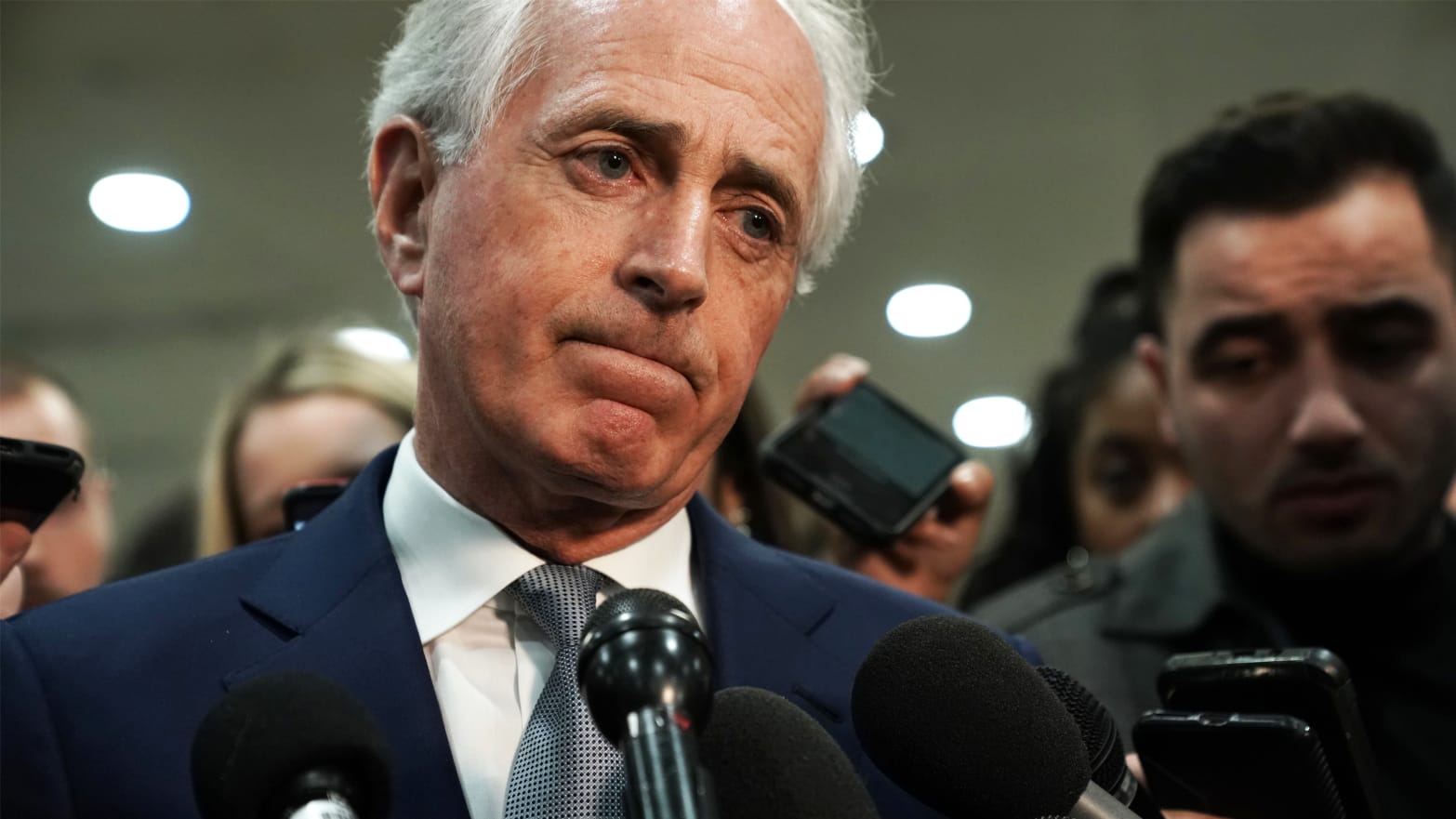Senators who attended a classified briefing with CIA Director Gina Haspel on Tuesday said there was “no question” in their minds that Saudi Crown Prince Mohammed bin Salman was directly involved in the killing of journalist Jamal Khashoggi, despite President Donald Trump’s equivocations on the U.S. intelligence assessment.
The senators’ verdict puts Congress on a collision course with the Trump administration over its continued alignment with Saudi Arabia. In an effort led by the president, the White House has cast doubt on the idea that the crown prince was involved in the October murder of Khashoggi inside the Saudi consulate in Istanbul, and has urged lawmakers to shy away from efforts to cut off U.S. support for the Saudi-led coalition in Yemen’s bloody civil war.
“Let me just put it this way. I think if he was in front of a jury, he would have a unanimous verdict in about 30 minutes. Guilty. A guilty verdict,” said Sen. Bob Corker (R-TN), the chairman of the Senate Foreign Relations Committee, referring to the crown prince. “He murdered him. No question in my mind. I had almost no question before. I have no question whatsoever now… that the crown prince directed the murder and was kept apprised of the situation all the way through.”
Haspel went to Capitol Hill in an effort to subdue senators who were furious with the Trump administration for only sending Defense Secretary James Mattis and Secretary of State Mike Pompeo for an all-senators briefing last week, and who believe the Trump administration has not sufficiently punished Saudi Arabia over the Khashoggi murder. Lawmakers present for that briefing told The Daily Beast that Mattis and Pompeo confirmed to them that Haspel was blocked from appearing at the request of the White House.
Corker said the messages conveyed in the twin briefings amounted to “the difference between darkness and sunshine”—a view other senators buttressed—and he suggested that the White House was sending the wrong message by maintaining the status quo with Saudi Arabia.
“The royal family inside the country looks to what the president says and so do people in the region,” Corker said. “... The message we’ve sent to them is one that will cause [the crown prince] to continue on the path that he’s on, and I’m sure other actors in the region will take note of that.”
Still, Pompeo has said publicly that there is “no direct evidence” linking the crown prince to the murder of Khashoggi, who was a Washington Post columnist. Sen. Lindsey Graham (R-SC), who has co-sponsored a bill that would cut off U.S. arms sales to Saudi Arabia, said Pompeo and Mattis were “following the lead of the president.”
“If the Saudi government is going to be in the hands of this man for a long time to come, I find it very difficult to be able to do business because I think he’s crazy, I think he is dangerous, and he has put the relationship at risk,” Graham added. “... There’s not a smoking gun—there’s a smoking saw.”
The conclusion reached by the senators who attended the briefing on Tuesday runs in stark contrast to the one expressed by the president. In a lengthy statement last month, Trump largely absolved the crown prince and cast doubt on the CIA’s conclusions, pledging to continue supporting the kingdom.
“It could very well be that the Crown Prince had knowledge of this tragic event—maybe he did and maybe he didn’t!” Trump said in the statement, which came after the U.S. slapped human-rights sanctions on 17 Saudi nationals believed to be involved in the killing.
While Haspel’s appearance on Capitol Hill satisfied some senators, others said she should have briefed the full Senate. Only the bipartisan Senate leaders and the top Republicans and Democrats on the relevant committees—foreign relations, intelligence, armed services, and appropriations—were permitted to attend, a fact that angered lawmakers who have been pressing the White House for an intelligence assessment.
“The definition of the ‘deep state’ is when intelligence communities have so much power that there’s no oversight,” Sen. Rand Paul (R-KY) told reporters. “I think the time has come for the Senate to grab back foreign policy and say that, you know what, the president—no president, this president or the previous president—has the power to take our country to war with Saudi Arabia in Yemen without permission from the Senate.”
Last week, 14 Republican senators joined all Democrats in voting to advance a resolution that would halt U.S. support for the Saudi-led coalition in Yemen. Many of them, though, only voted to advance the measure as a way to express disapproval with the White House’s response to the killing of Khashoggi. Corker has said he prefers that the White House take substantive actions to punish the kingdom, but is prepared to back congressional action absent a sufficient response from the executive branch. The Senate could vote as soon as later this week to officially open up debate on the Yemen resolution, which could prompt a series of unlimited amendments to the legislation.
“Some people want to tie the Yemen piece in with the Khashoggi piece, so that makes it more complicated,” said Corker, who is working on a substitute amendment aimed at punishing Saudi Arabia “without harming our own national interest.”
Indeed, Corker’s Democratic counterpart atop the foreign relations committee, Sen. Bob Menendez (D-NJ), said Congress should address “both the war in Yemen as well as the killing of a United States permanent resident and journalist in Jamal Khashoggi.”
Sen. Bernie Sanders (I-VT), one of the Yemen measure’s co-sponsors, fumed at his colleagues for trying to alter the substance of the legislation.
“The idea that people are trying to muck it up by opening up the process to have all kinds of amendments, which have nothing to do with the tragedy in Yemen, is really unfortunate, and I hope that we can overcome that,” Sanders told reporters.

